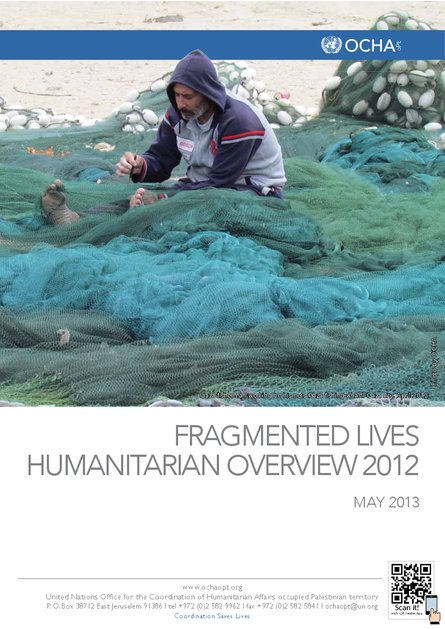
This is the second year in which the United Nations Office for the Coordination of Humanitarian Affairs (OCHA) has outlined the key humanitarian concerns in the occupied Palestinian territory in one Humanitarian Overview document. This annual report aims to serve as a comprehensive overview or ‘snapshot’ of the humanitarian situation in the oPt in a given year, to monitor trends and developments, and to inform policy and programming.
As with last year’s report, the concerns outlined in the present report reflect the advocacy priorities identified by the Humanitarian Country Team (HCT), the main humanitarian coordinating body for UN agencies and Non Governmental Organization (NGO) partners in the oPt. In 2012, these priorities remain Accountability; Life, Liberty & Security; Forced Displacement; Movement & Access; and Humanitarian Space.
The report is structured around these priorities, with the issue of accountability addressed throughout the report. In addition, concerns related to the main clusters – Health; Education; Water, Sanitation and Hygiene (WASH); and Food/Livelihood – are detailed in separate chapters at the end of the report, which were provided by the relevant cluster focal points. As with all OCHA reports, the Humanitarian Overview 2012 is based on data collated and crossed checked from multiple sources including OCHA , UN agencies, international NGOs, Palestinian and Israeli NGOs and, where possible, government sources. To the extent possible, the data is correct at the time of publication.
The Way Forward addresses the need for improved accountability for violations of international humanitarian and human rights law in the oPt. There is a crisis of accountability in the oPt - the failure to hold all parties to the conflict to account for violations of international law, contributes to a culture of impunity and repeated threats to the enjoyment of human rights and dignity of the Palestinian people. Israel, as the occupying power, bears the primary responsibility for the protection of the civilian population and ensuring their basic needs are met, but all parties to the conflict must respect their obligations under international humanitarian law. In addition, all states share responsibility for ensuring respect for international humanitarian law in the oPt and promoting compliance with human rights obligations. The sections at the end of each chapter identify immediate and longer-term actions that need to be implemented by a range of stakeholders to improve the humanitarian situation and to remedy the protection concerns.
